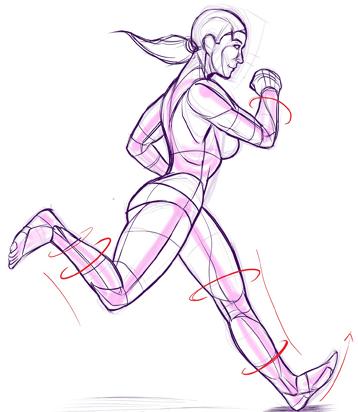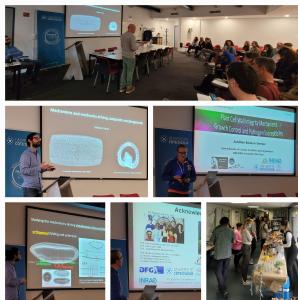Académie d'Excellence "Complexité et diversité du vivant"
4th Academy 4 Research Webinar - Immunity, Sport & Ageing - June 15th, 2021
- Research
- IDEX
- Sports - Recreation
- Staff life
on the June 15, 2021
Online

It is our pleasure to announce the Academy 4 Research Webinars on Bio-Medical & Transdisciplinary Topics.
They take place every 3rd Tuesday of the Month.
The 4th session took place online on the 15th of June 2021 at noon (12pm).
PROGRAM - IMMUNITY, SPORT & AGEING
SPEAKER 1: Dr Anne-Sophie ROUSSEAU
Maître de Conférence Université Côte d'Azur, HDR, Centre Méditerranéen de Médecine Moléculaire, INSERM U1065, Bâtiment Universitaire ARCHIMED 151 route Saint Antoine de Ginestière, NICE.
Team 9 Immunometabolic challenge of Immune Cells in obesity, diabetes and cardiovascular disease
Title: Immunometabolism, ageing and physical activity - towards new preventive approaches of lifestyle-related diseases.
Abstract: Lifelong exercise is proposed to be a model of successful aging due to improvement of immunometabolic responses and anti-inflammatory environment. However, underlying mechanisms of anti-inflammatory and anti-immunosenescence effects of lifelong exercise are complex and have not yet been fully elucidated. Indeed, the ability of physical fitness to directly modify the metabolism of immune cells is unproven. Anti-inflammatory regulatory T cells (Tregs) are the most metabolically flexible CD4+ T cells by using both glycolysis and Fatty Acid Oxidation (FAO) which allow them to migrate in tissues. We have recently published that increasing the activity of a fatty acid metabolism modulator (peroxisome proliferator activator beta/delta (PPARβ/δ)), modifies T cell metabolism, development, and function in different physiological and pathological conditions, and alters skeletal muscle regeneration. More recently, in the elderly mouse, we made an important discovery by deleting this fatty acid modulator specifically in T cells (KO T PPARβ/δ). Unexpectedly, we prevented changes in body composition (muscles and visceral adipose tissues) and loss of endurance capacity related to aging, suggesting a crucial role of T cells, and also probably their metabolism, in the effects of aging. Elderly KO T PPARβ/δ mice had an endurance capacity at least twice higher than their "control” aged counterparts. The immune changes investigated for the time being, mainly concerning the Tregs cell population, suggests they could mediate a potential protective effect on aging. Thanks to this original mouse model invalidated for a modulator of metabolism specifically in T cells, protecting them from susceptibility to age-related frailty and less inclined to develop a chronic pathology, we plan to characterize biomarkers associated with an “ideal” aging, which signature would be validated in humans through clinical studies.
SPEAKER 2: Dr Emeline MICHEL
MD CHU NICE, PhD student Université Côte d'Azur, Faculté des Sciences du Sport / Campus STAPS,
Laboratoire Motricité Humaine, Expertise, Sport, Santé (LAMHESS) 261, Boulevard du Mercantour, NICE.
Laboratoire LAMHESS
Title: Fragility - from the functional to the biological approach
Keywords: Immunity, Fragility, Adapted Physical Activities, Ageing
Related bibiography:
AS Rousseau et al. Invalidation of the Transcriptional Modulator of Lipid Metabolism PPARb/d in T Cells Prevents Age-Related Alteration of Body Composition and Loss of Endurance Capacity. Frontiers in Physiology 2021. DOI: 10.3389/fphys.2021.587753.
ORGANIZERS:
Academy of Excellence 4 "Complexity & Diversity of the Living Systems"
Academy of Excellence 5 "Human Societies, Ideas and Environments"
Graduate School and Research HEALTHY - Health Science Ecosystems
Graduate School and Research LIFE - Life and Health Sciences
Institute NeuroMod - Cognitive Systems, Normality and Pathology of the Human Brain and Computational Neurosciences
Labex SIGNALIFE - Network for Innovation on Signal Transduction Pathways in Life Sciences




















